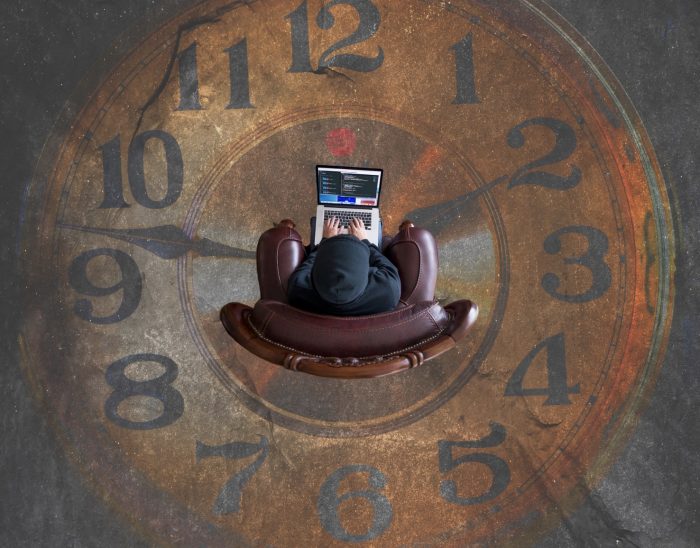
Last year before COVID-19 hit, I was living in the little surfing town of Uvita, Costa Rica, while enrolled in the Elephant Academy Find Your Voice course.
Besides writing, my other major concerns in life were the tides (to optimize the timing of my surf sessions) and whether there would be live music at the bar in town. Oh, and maybe taking pictures of the sloth that lived in the tree across the dirt road in front of my home.
My life was super chill, a welcome break from the decade spent in the mind-numbing, soul-sucking busyness career as a project manager in Big Pharma.
Meditating was easy; staying present in the moment was easy, as I didn’t constantly have 96 things on my to-do list to pull my attention elsewhere.
But after two years of semi-nomadic wandering, I found myself and found my purpose, and then it was time to get back to work.
One bizarre, COVID-19-filled year later, I’m helping to establish an interfaith spiritual community and working part-time to pay the bills. So when I signed up to be a mentor in the Elephant Academy this spring, I suddenly found myself eyeballs-deep in busyness again.
I experienced a sensation I hadn’t felt in a while: the wired, frazzled, over-caffeinated, and constantly-behind feeling of trying to do too much, striving for the hyper-productivity that is so celebrated in our culture.
With that sensation came the stress of feeling pulled in 20 different directions at the same time, manifesting in my body as an ever-present feeling of weariness seeping into the marrow of my bones. And also a stomach-clenching guilt from the sense that there is always more I should be doing.
Our North American culture lives in a state of constant hurry. Do you know any working-age adults who are not constantly buried under an onslaught of work, constantly behind, constantly trying to catch up, and constantly needing more time?
We don’t realize how pervasive this feeling is until we live in another culture—live, for a stretch of time, not just visit. Life doesn’t have to be a constant, blurred rush—we just don’t know that there is any other option.
Our society celebrates busyness: a 40-hour workweek at minimum, 60 hours if we’re really committed to achieving something and making something of our life.
On top of that, we’re supposed to exercise, spend time with friends and family, cultivate hobbies, and fix up our house in order to live a balanced life. Everywhere we look—movies, TV, magazines, Facebook—cultural messages harangue us with all these things we should be doing in order to live up to our full potential.
It doesn’t have to be like this.
If you’re tired of running faster and faster just to stay where you are, you might consider trying something different: trying a mindful approach to work. Bringing more mindfulness into our life doesn’t require a monumental shift in our schedule.
We can gradually introduce a little more sanity and focus with these three simple tricks:
1. Mindful transitions between work and rest
When you’re done working, methodically and intentionally close down all the windows and programs on your device.
While consciously shutting them down, imagine that you are closing down these mental programs in your head as well, deliberating backing your way out of the rabbit hole of endless work.
Make a conscious transition from work-time to down-time. The more this sounds like utter nutzo-talk to you, the more you should try it.
You might think it saves time to leave all those documents open so you can jump right back in when you return. However, when we walk away from work like that, those mental programs are still spinning in our minds, making it difficult to experience a genuine break from work. And when we return to be greeted by 34 open windows all demanding our attention, our focus is immediately splintered in all those different directions.
Give it a try and notice the calming effect on your mind when you spend 15 seconds intentionally closing down your work. Also, notice the effect on your attention when you fire up your device to an empty screen, which provides space to work with targeted intent.
This allows us to work smarter, not harder, to identify the actions we need to take to make the most impact in moving our work forward, rather than haphazardly checking off one check box after another.
2. Mindful Typing
When I’m in a rush, I try to type super fast, which means I often make mistakes that require me to delete words or sometimes whole sentences.
Obviously, this wastes time. A lot of time. When we type deliberately and intentionally, it may feel like we’re moving more slowly, but we don’t waste all that time deleting and correcting. Plus, this also helps calm the mind and again helps us approach work in a way that is smarter, not harder.
This might sound ridiculous, but consider giving it a try, just for 30 minutes to start.
Notice the effect on your mental state when you give 100 percent of your attention to the words that you are typing. You might notice that your mind is a little calmer, a little clearer. Maybe the words flow a little easier, rather than trying to gush out in a hurried, erratic jumble.
3. Avoid multitasking
Yeah, I know, this one is cliché, we’ve all heard this a thousand times, and we all scoff each time we hear it. But have you ever really tried it?
If you have a task you need to focus on, try closing down chat, email, and other programs for 60-90 minutes and give yourself a chunk of time to focus solely on that one task. Notice the difference in your mind when you give yourself this precious gift of undivided attention.
Each morning I digitally seal myself off in a cocoon of quiet for one hour to write, giving my mind the mental space to allow the words to flow. If I don’t, if I’m texting or chatting or emailing, the page gets spasmodically populated by a few disjointed sentences. But when I give myself that gift of focus, and that’s when a little magic happens.
We don’t have to live in a continual state of frazzle, no matter how much our culture celebrates the pedal-to-the-metal constant sprint. We can choose a different mode of existence; all we need is a little effort and mindful intent.
Just give one or two of these a try, and see how it affects your mental state, see if you feel a little less scattered, a little more relaxed, and more focused.
You might find you’re not only more productive but less stressed as well.
Give it a try, and let us know how it goes in the comments.
~
AUTHOR: MATTHEW BUSSE
IMAGE: KEVIN KU/UNSPLASH

Read 29 comments and reply